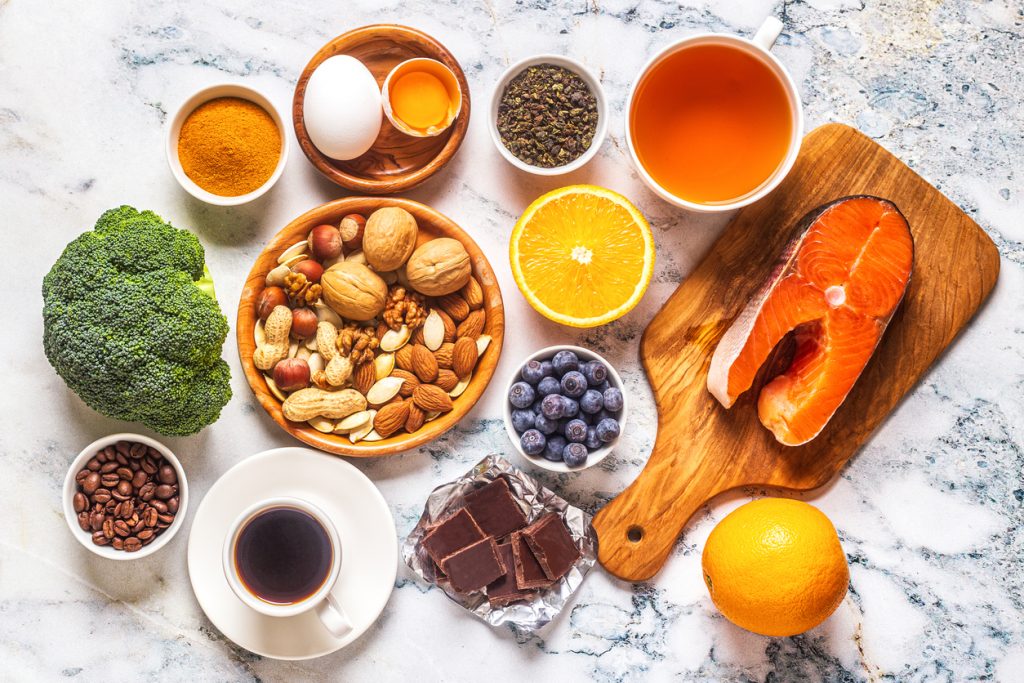by Jennifer Blau, CHC
As a wellness coach, it’s my job to share (or suggest) what you SHOULD be eating for weight loss or achieving your optimal health. We work together to make little changes gradually to your diet so that you can feel your best. I spend the majority of my day talking to other people about their diet, but today I’m going to talk about what I eat!
I’m sure you’re a little curious about what a dietitian eats in a day. We all have this curiosity, what does this person or that person eat… what’s their secret to great health? Well, I hate to tell you but there’s no secret. Eat real, clean, nutrient-dense, properly prepared whole foods. That’s it!
It does get more personal than that depending on your genetics, your digestion, if you have allergies or sensitivities, or what your goals are. But fundamentally, eating healthy is about feeling great and nourishing your body from the inside out. We easily get caught up on wanting to lose weight or fit into a certain-size pant, but instead weight loss should be looked at as a bonus in your overall health journey.
There’s certainly not one food that works for everyone when it comes to weight loss, but generally increasing the nutrient density of your food, eating less processed foods, and eating more anti-inflammatory foods helps reset your body everyday with your fork. Whether I’m trying to trim down or just feel my best, here are some of my favorite foods I eat daily and also recommend to my patients who are trying to lose weight.
- Avocados – this rich, healthy fat is loaded with monounsaturated fat, fiber, and potassium. Though they are high in fat, eating avocados doesn’t translate to fat on your body. Avocados can help improve digestion, among many other things! Read more about avocados here. (And if you think avocados are too expensive, you can sometimes find them on sale for just 40 cents or less!)
- Coconut Oil – while coconut oil gets a bad rap due to its high saturated fat content, it also has medium chain triglycerides (MCTs) and other properties that boost your “HDL,” or good cholesterol. There is no miracle food and everything should be consumed in moderation, including coconut oil. Use it to saute vegetables, put a little in your tea or coffee, add to soups or stews, or use in healthy paleo baked goods.
- Greens – kale, chard, mustard, collards, parsley, spinach, arugula, baby greens.. all the greens! They are packed with magnesium, calcium, potassium, manganese, folate, and vitamin K making them true superfoods. A few cups of spinach or kale will give you a nice range of nutrients without affecting your overall caloric intake.
- Protein Packed Salads – large hearty salads are simple, fast, and a good way to pack one meal with lots of nutrient-dense foods. Think outside of using lettuce; try using kale, cabbage, cucumbers, fennel, shredded veggies like squash or beets, the possibilities are endless! When people tell me they hate salads because they’re boring, I give them tips to up their salad game. I would get bored of eating romaine, carrots, and tomatoes too! Make sure you’re adding good lean protein such as salmon, tuna, chicken, turkey, or grass-fed beef and topping with crunchy nuts or seeds. Try different delicious paleo dressings to jazz up the flavors. Add a spoonful of fermented vegetables to add healthy probiotics and a punch of flavor, too.
- Starchy Veggies – when trying to increase plant foods into your diet, adding foods like potatoes, winter squash, and beans in place of grains like pasta can produce amazing results. These are full of vitamins and minerals as well as fiber to help with digestion and eliminating toxins.
- Wild-Caught Fish – I absolutely love seafood. Increasing the amount of low-mercury fish you eat weekly can help promote weight loss and a healthy microbiome due to the high fatty acid content and butyrate. Sources like wild-caught salmon are an awesome source of protein that can help reduce your appetite; studies show that protein may be able to reduce the fat-storing hormone, leptin. Bake or grill fish and serve with vegetables like leafy greens, asparagus, or squash.
- Green Smoothies – great for those busy mornings or as an afternoon snack when we need a boost. Packing a smoothie with protein, fats, and greens can certainly help with weight loss and supply a range of vitamins and minerals too. I throw anything into a smoothie – greens, frozen fruit, avocado, or even frozen cauliflower!
- Seeds – I typically add chia seeds, hemp seeds, or ground flaxseed to my smoothies too. Ground flaxseeds help support hormone balance and are high in fiber. They have bulking properties and feed healthy gut bacteria to improve bowel regularity. Flax seeds are also rich in B vitamins, magnesium, and zinc. Flaxseeds are high in selenium which helps to reduce inflammation, boost thyroid health, and promote weight loss.
- Eggs – organic free-range eggs are good choices for the morning, noon, or night as far as I’m concerned (as long as you are not sensitive to eggs)! One whole egg has around 7 grams of protein, so one omelette has 14 to 21 grams depending on how many eggs you use. Eggs are a good source of B12, biotin, and choline. Load up your omelette with sautéed spinach or any fresh vegetables. The protein increases your resting metabolic rate which helps us burn more calories throughout the day when you’re not active.
- Herbal Tea – I’m a big fan of herbal teas, I still love my coffee but I also enjoy a cup of tea here and there. Some herbal teas may help to reduce inflammation in the body, improve digestion, and aid in eliminating toxins. Caffeine-free herbal teas are a great alternative when you feel like you are becoming dependent on coffee. Try backing off or drinking decaf and enjoy some tea for a few days.
These foods and more will help power you through your day to be the healthiest, happiest version of yourself!






